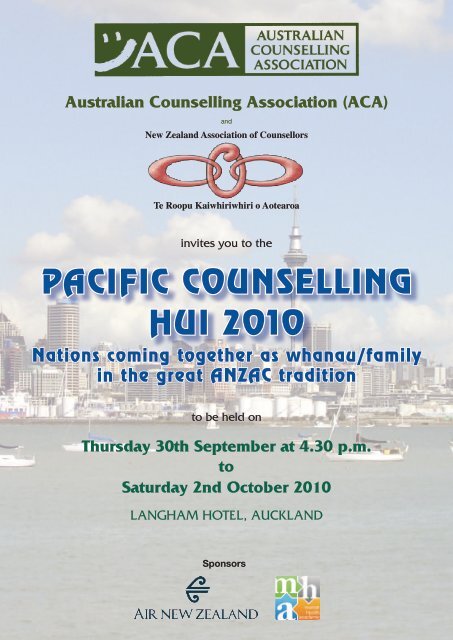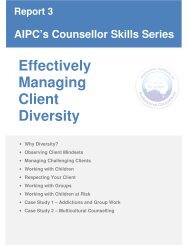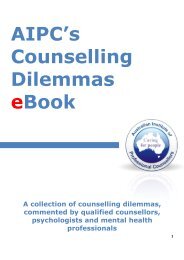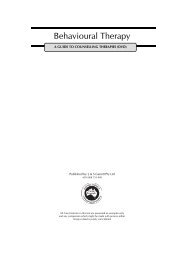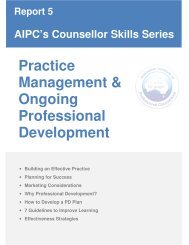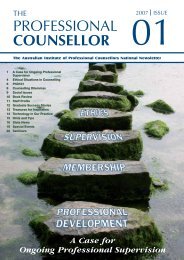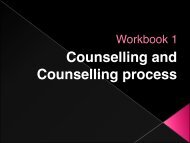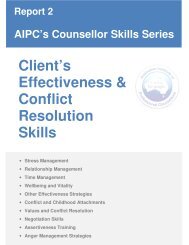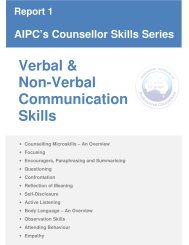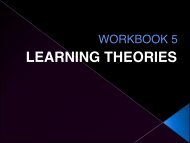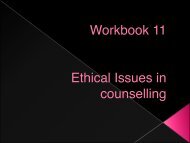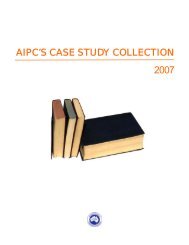Conference Flyer - Counselling Connection
Conference Flyer - Counselling Connection
Conference Flyer - Counselling Connection
You also want an ePaper? Increase the reach of your titles
YUMPU automatically turns print PDFs into web optimized ePapers that Google loves.
Australian <strong>Counselling</strong> Association (ACA)<br />
and<br />
New Zealand Association of Counsellors<br />
Te Roopu Kaiwhiriwhiri o Aotearoa<br />
invites you to the<br />
Pacific CounsElling<br />
Hui 2010<br />
Nations coming together as whanau/family<br />
in the great ANZAC tradition<br />
to be held on<br />
Thursday 30th September at 4.30 p.m.<br />
to<br />
Saturday 2nd October 2010<br />
LANGHAM HOTEL, AUCKLAND<br />
Sponsors
Pacific <strong>Counselling</strong> Hui 2010:<br />
Nations coming together as whanau/family in the great ANZAC tradition<br />
Time:<br />
9.00am-4.00pm<br />
Length: All day<br />
12:00 noon – 4:00 pm<br />
4:0o pm<br />
4:30 pm<br />
Thursday 30 September 2010 Pre-conference<br />
University of Auckland, Tamaki Campus, corner Merton and Morrin Road, Glen Innes<br />
Session: Workshop<br />
Title: Pacific Research Symposium: Cross-cultural Conversations about Pacific Identities, Mental<br />
Health and Wellbeing<br />
Description: Of the many themes that interweave to shape Pacific people’s lives and wellbeing, particular<br />
strands that will be addressed in this symposium include identities, “in-betweenness” and<br />
connectedness; change, loss, grief and gain; resilience and joy; spirit and wellbeing. This one-day<br />
Pacific research symposium is an opportunity for dialogue among researchers and practitioners in<br />
fields related to the mental health and wellbeing of people of the Pacific— Máori, Pasifika, and<br />
Aboriginal—around these themes.<br />
As well as a keynote presentation and papers presented in concurrent sessions, there will be an<br />
open space throughout the day for Máori as tangata whenua to meet and kórero with Aboriginal<br />
and other delegates.<br />
Registration at Langham Hotel, Symonds Street (for those not at Pre-conference workshop)<br />
Buses leave to go to Powhiri<br />
Powhiri (welcome) at Orakei Marae, Kitemoana Street<br />
Followed by kai (meal) together and socialising<br />
Transport returns to Langham Hotel at approximately 9 pm<br />
Friday 1 October 2010<br />
8:00 am – 8:45 am<br />
8:45 – 9:00 am<br />
9:00 am – 10:00 am<br />
Registration at Langham Hotel<br />
Opening of day<br />
Session: Keynote<br />
Presenter: Metiria Turei<br />
Title: Opening Address<br />
Description: The first keynote address will be given by Metiria Turei. An Aotearoa/New Zealand Green<br />
MP since 2002, Metiria was elected Green Party Co-leader in June 2009. Metiria’s focus is Social<br />
Equity, Children’s Issues and Electoral Law Reform. She’s been leading the campaign to save our<br />
treasured places from mining, protect the Mokihinui River, and has fought for greater protection for<br />
marine animals and the marine environment.<br />
Metiria has also worked on Justice issues advocating for implementation of Te Tiriti o Waitangi,<br />
restorative justice, the rights of victims and effective rehabilitation of offenders. When able to<br />
escape the world of politics, Metiria spends time with her family in Dunedin.<br />
Morning tea 10:00 am – 10:30 am<br />
Time:<br />
10:30 am – 12:00 pm<br />
Session 1A Papers: (30 minutes each)<br />
Presenter: Robina Otrupeck<br />
Session Title: Australian “Sorry Business” and culturally appropriate counselling.<br />
Description: The grief suffered across the generations by Indigenous Australians over the last 200<br />
years is often the source of the current discontent that has lead to many mental health issues. The<br />
intention of this presentation is to look at important aspects of Aboriginal cultures to enable useful<br />
assistance in this grief. An attempt to understand and accept these differences and generate the<br />
respect that will improve the success rate in therapeutic approaches.<br />
Presenter: Meri Ormsby<br />
Session Title: Heart transplantation: A Mäori Whanau Journey<br />
Description: How we coped through this extremely traumatic experience. Three years post<br />
transplantation - dilemmas still arise. Communication, language and culture played an integral role<br />
in this process. However, our beliefs and experiences as instilled in our upbringing often could<br />
not be discussed openly with medical professionals, “They just wouldn’t understand …”. Spiritual<br />
questions still remain unanswered in regards to future developments, e.g. whakapapa – is the<br />
blood line altered Should we be permitted to do as we like with our native organs. E.g. burying<br />
lungs under the rose bush As organ donation becomes more common these questions will<br />
become more evident and will need addressing.
Presenter: Claire Ferguson<br />
Session Title: Out of our comfort zone: Holistic counselling in a multi-cultural school<br />
Description: Effective pastoral services depend on leadership from the Prinicpal and the Board of<br />
Trustees, teamwork and trust among all involved in the pastoral network. The counsellor has a<br />
critical role in developing and maintaining the pastoral network as she or he is a nexus linking<br />
many ‘player’ in the school, community and key agencies.<br />
In developing pastoral services our school has been guided by the vision, values and principles of the<br />
New Zealand curriculum. This paper describes the philosophy behind and the implementation of our<br />
pastoral services which embraced all aspects of student well-being and development, the counsellor’s<br />
role in the process and aspects of safe practice in a challenging environment.<br />
Time:<br />
10:30 am – 12:00 pm<br />
Time:<br />
10:30 am – 12:00 pm<br />
Time:<br />
10:30 am – 12:00 pm<br />
Session 1B Workshop (90 minutes)<br />
Presenter: Stan Korosi & Gabby Skelsey<br />
Session Title: Coming together discussing intimacy, sex and the fragility of life: how therapists<br />
respond to working with couples regardless of gender<br />
Description: Communication in relationships is paramount to the healthy continuation of a<br />
relationship. However, when intimacy and sex are discussed, this conjures up different meanings<br />
for individuals. Couples and therapists have to negotiate the paradoxical relationship between<br />
sex and intimacy, and male and female notions of these aspects of relationship. What is specially<br />
required of therapists to deal with sex and intimacy that is different from what they do now This<br />
workshop discusses how to create a therapeutic relationship by exploring how therapists can locate<br />
themselves and facilitate the communication that is so paramount to the healthy continuation of a<br />
relationship.<br />
Session 1C Workshop (90 minutes)<br />
Presenter: Mike Williams<br />
Session Title: Using “Undercover Teams” to re-story Bullying Relationships<br />
Description: Traditional responses to bullying and harassment in schools usually focus on either<br />
punishment or exclusion of the person or persons who are bullying or by attempts to change the<br />
behaviour of the victim. The usual approaches schools make to bullying behaviour are punitive.<br />
Ironically, the message beneath the surface is that the right to bully is not so much wrong as it is<br />
reserved for those from the school authorities. Undercover Teams by contrast, use a relationally<br />
transformative and deeply respectful approach based on the principles of narrative mediation<br />
whereby those responsible for the bullying are recruited into a select team who make it their<br />
mission to interrupt bullying behaviours.<br />
This workshop uses real-life stories to describe how the school counsellor uses the Undercover Team<br />
Approach in a strategic way to disrupt a story of bullying relations in a secondary school classroom<br />
and rewrite an alternative story of support for the victim. It includes a description of the process<br />
beginning with the notification of the bullying event and describes the creation of the team. Its<br />
progress is tracked to show how the team eliminates the bullying. It shows how the Undercover<br />
Team Approach opens up an expanded range of positions for the members of the undercover team,<br />
how these changes occur and how the team members and the counsellor co-author a new story of<br />
peaceful relations in a high school classroom.<br />
Session 1D Workshop (90 minutes)<br />
Presenter: Richard Hill<br />
Session Title: Therapy and the Brain<br />
Description: We will overview the brain and mind especially examining the neurobiological<br />
processes of stress and anxiety and their effect on behaviour; The social brain; Mirror neurons and<br />
interpersonal neurobiology. We will look at behaviours such as ADHD, Alexithymia, Compulsive<br />
Disorders and Learning Difficulties borrowing from the teachers of Daniel Siegel (IPNB); Lou<br />
Cozolino; Ernest Rossi; And Matthew Leiberman amongst others. The information is presented in<br />
simple, understandable language that provides a foundation for those who wish to include an<br />
understanding of the brain and mind into their practice.<br />
Lunch: 12:00 – 1:00 pm
Time:<br />
1:00 pm – 2:30 pm<br />
Session 2A Papers (30 minutes each)<br />
Presenter: Marilyn Raffensberger<br />
Session Title: A rewarding but complex practice environment<br />
Description: Clients with an intellectual disability are an underserved client group in our profession.<br />
They experience the same range of emotional and mental health needs as the general population,<br />
but numerous barriers impede their engagement in counselling. Counsellors have an opportunity to<br />
build bridges across these barriers and promote positive outcomes. Unfortunately, many counsellors<br />
are unfamiliar or uncomfortable with working with clients with an intellectual disability. Questions<br />
and concerns abound. This presentation is based on a multiple case study of six clients with an<br />
intellectual disability, their counsellors and their support people. Some positive outcomes were<br />
noted in each case. This presentation will provide a description of this rewarding but complex field<br />
of practice. This paper is co- authored with Associate Professor Judi Miller and Dr. Brigit Mirfin-<br />
Veitch.<br />
Presenter: Beverley Flitton<br />
Session Title: FRIENDS for Life in North Canterbury<br />
Description: FRIENDS is a 10 week programme with 2 booster sessions for young people who are<br />
experiencing anxiety. The programme has a parenting component and is designed to build resiliency<br />
and to teach children about feelings, body awareness, coping skills and problem solving skills. This<br />
was a collaborative piece of work between a government agency, Canterbury District Health Board<br />
(CDHB) and a non government agency, Family Works (FW) North Canterbury. The presentation<br />
will discuss the findings of the study and will include a discussion on the experience of working<br />
across agencies; delivering a programme in North Canterbury; working with young people who<br />
are experiencing anxiety/depression and their families and the pros and cons of a prescribed<br />
intervention.<br />
Presenter: Cherie Martin<br />
Session Title: A Therapeutic Intervention for Separated Parents in High Conflict<br />
Description: A therapeutic framework to work with complex issues around separation. A case study<br />
will be followed that will help practitioners to identify blockages that may need to be worked<br />
through. The children are also seen in this model and the impact on them is fed back to parents<br />
strategically. This is a model that helps practitioners feel grounded in what is often rigorous work.<br />
Time:<br />
1:00 pm – 2:30 pm<br />
Time:<br />
1:00 pm – 2:30 pm<br />
Session 2B Workshop (90 minutes)<br />
Presenter: Alastair Crocket<br />
Session Title: “A very fractured thing” or “searching for a place to stand” Exploring connections<br />
between settler identities in Australia and Aotearoa.<br />
Description: In Aotearoa New Zealand and Australia both political action and inaction invite<br />
practitioners who identify with settler heritages to consider our commitment to postcolonial<br />
counselling praxis.<br />
The starting point for this presentation is an observation that white Australians and Pakeha New<br />
Zealanders frequently name many commonalities, such as sporting rivalries and the ANZAC tradition.<br />
However, the fundamental commonality of our colonising heritages is seldom named.<br />
An introductory paper will foreground a facilitated conversation among participants who will be<br />
invited to speak from their experiences of holding an identity that has been shaped by connection to<br />
a colonising heritage or by contact with a colonising tradition and practices.<br />
Session 2C Workshop (90 minutes)<br />
Presenters: Monika Jephcott and Jeff Thomas<br />
Session Title: <strong>Counselling</strong> Children Using Play & Creative Arts Therapies<br />
Description: Many adult problems addressed by Counsellors, Psychotherapists, Psychologists and<br />
other mental health professionals have their origin in childhood. 20% of children have emotional,<br />
behaviour and mental health issues. Neuroscience tells us that the ability to change our mind is easier<br />
when we are young. The presentation will demonstrate a model for alleviating these problems. It will<br />
also include the latest clinical outcomes, drawn from over 3000 cases, including evidence that our<br />
view of Maslow’s hierarchy should be revised. Although focussed on children, the workshop will also<br />
provide participants with ideas for using these skills with adults and adolescents.
Time:<br />
1:00 pm – 2:30 pm<br />
Time:<br />
1:00 pm – 2:30 pm<br />
Session 2D Workshop (90 minutes)<br />
Presenter: Jason Dixon<br />
Session Title: Introduction to Structured Relapse Prevention: An integrative approach to working with<br />
alcohol and other drug problems<br />
Description: Wellness is a way of life oriented to optimal health and living fully within the human<br />
and natural community. Clients struggling with alcohol and other drug problems are seeking an<br />
improvement wellness and quality of life. Structured Relapse Prevention (SRP) is a program of<br />
integrated counselling strategies that includes Motivational Interviewing, cognitive-behavioural<br />
treatments, and a variety of coping skills strategies that are organised to meet clients’ different<br />
needs and treatment goals. Clients are met where they are in their current substance use and<br />
autonomy for change remains with the client. This presentation is an introductory overview for<br />
Counsellors who wish to expand their skills repertoire for working with clients presenting with<br />
alcohol and other drug problems.<br />
Session 2E Mäori Roopu Hui at Orakei Marae<br />
Presenter: Vi Woolf, Te Ahi Kaa and memebrs of the National Maori Roopu<br />
Session Title: National Maori Roopu Hui<br />
Description: Members of the National Maori Roopu will take time to caucus together about the<br />
issues relevant to them. Please indicate if you will be attending this hui.<br />
Afternoon Tea: 2:30 pm – 3:00 pm<br />
Time:<br />
3:00 pm – 4:30 pm<br />
Session 3A Papers (30 minutes each)<br />
Presenters: Jeannie Wright, Brent Gardiner, Steve Lang, Catherine Love and Kitt Coomber<br />
Session Title: Counsellor education in Aotearoa New Zealand: moving towards change<br />
Description: This presentation tracks the revision of a counsellor education programme; the<br />
modifications to which are informed by results of research into graduate student counsellors’<br />
experiences of their training some years on. In response to these findings and other<br />
research we propose a pluralistic culture-centred model of counsellor education which<br />
furthermore responds to the intent of Te Tiriti O Waitangi. The revised programme<br />
merges the work of Durie (2007) and McLeod (2009) to create a collaborative model of<br />
counsellor education and practice. The authors argue that this approach is fitting for<br />
contemporary counselling practice as the field confronts a critical time in its history.<br />
Presenter: Judi Miller<br />
Session Title: Taking a walk on the light side: interpreting humorous representations of counselling in<br />
cartoons and graphic art in popular print media<br />
Description: In this paper I will present an illustrated description of cartoonists’ representations<br />
of counselling and interpret them in the context to two elements of intellectual and practical<br />
professional activity. The first focuses on counsellors’ and psychotherapists’ enthusiastic alignment<br />
of their work with research that emphasises the health benefits of humour and the impact of such<br />
adaptive strengths as optimism, faith, courage and humour on outcomes in therapy. The second<br />
element focuses on the potential benefits, or not, of using humour as a medium to promote the<br />
profession of counselling and psychotherapy. Given current research confirming the impact of<br />
expectancy on therapeutic outcomes I expect the paper to encourage discussion of the place of<br />
humour in our profession.<br />
Presenter: Ann Moir-Bussy<br />
Session Title: Engaging Diversity in Counsellor Education through dialogic teaching – A model<br />
developed with Hong Kong Students for creating space for transformative learning<br />
Description: It is a challenging task to engage students in a dialogic encounter where they can<br />
tap into their rich implicit cultural knowledge and transform what the ‘received’ from lectures and<br />
books into either an amalgamation of Eastern and Western ideas, or an appreciation of their unique<br />
Chinese perspective. This paper explores the dialogic process taken with Chinese students and will<br />
examine the nature of the dialogic encounters and what the students themselves learnt and felt<br />
about this journey. It is hoped that this experience of these Chinese students will be an example of<br />
engaging with diversity in counsellor education.
Time:<br />
3:00 pm – 4:30 pm<br />
Time:<br />
3:00 pm – 4:30 pm<br />
Time:<br />
3:00 pm – 4:30 pm<br />
Session 3B Workshop (90 minutes)<br />
Presenter: Joane Goulding<br />
Session Title: Developing a Child’s Emotional Resilience – The Minds Firewall<br />
Description: Joane is a published author and engaging speaker who has delivered papers at<br />
conferences around the world. She offers health professionals and parents an absolutely safe,<br />
ethical solution in creating happy, calm and stress free home environments. The process taking<br />
only a few moments is presented by parent’s whist the child sleeps. It’s endorsed by members of<br />
the medical and psychological professions. Devolved in the 1970’s, it’s a self empowering process<br />
helping to balance children’s behaviour issues, anxiety, stress and relationships. Joane will discuss<br />
the positive down line ramifications of change and calmness that SleepTalk creates, which<br />
permeates throughout the entire family.<br />
Session 3C Workshop (90 minutes)<br />
Presenter: Jeannie Grant<br />
Session Title: So You Think You Can’t Juggle: reclaiming experiences of success in the moment.<br />
Description: Juggling has been around for centuries bringing entertainment and delight to many.<br />
Most research associated with the benefits of juggling involve brain plasticity, metaphorical<br />
applications and motor skill development. My experience has been that virtually all people can<br />
learn the classic three-ball cascade and that it is in the learning experience that another form of<br />
therapeutic magic takes place. I have found that when people are given permission to play with<br />
failure and even rename and re-experience it as a vital tool moving towards ‘success’ that anxiety<br />
reduces as well as a reconnection with enthusiasm for trying. Trust is woven into the process by<br />
developing an identity as a ‘juggler’ through the telling of stories about the ways jugglers see each<br />
other that is different to ‘outsiders’. By becoming part of the juggling ‘culture’ there are certain<br />
entitlements to the mysteries and magic of the success experience. This is a practical workshop<br />
where you will experience this magic first hand and become part of the juggling family. You do not<br />
need to bring anything with you, except the hope of a unique experience.<br />
Session 3D Workshop (90 minutes)<br />
Presenter: Clive Jones<br />
Session Title: Sport <strong>Counselling</strong>: Bringing social and emotional factors into the mix of elite sporting<br />
performance, healthy athletic development and the individual athlete’s wellbeing.<br />
Description: Sport Counsellors’ are specialists in psychotherapeutic intervention who aim to enhance<br />
performance of the elite athlete through facilitating positive mental health. Recent events in<br />
Australia Sport have shown a pressing need for greater involvement of the sport focused counsellor<br />
due to a noticeable increase in reported incidents of drinking binges, illicit drug use, violent acts,<br />
sexual assault and other forms of extremely destructive behaviours by high profile elite competitors.<br />
Counsellors working in the sporting community are strategically placed as specialists in the filed<br />
to address this issue head on. This workshop highlights five key areas of influence in the aetiology<br />
and treatment of poor behaviour in elite sport. These areas include; confused boundaries with<br />
aggression, limited self image, poor emotional regulation, deficiencies in emotional intelligence,<br />
and an excessively narrow mental focus that are cultivated through destructive sport specific sub<br />
cultural influences. Sport based counselling approaches are discussed to establish how the sport<br />
focused counsellor can help facilitate healthy athletic development and optimum sporting performance<br />
through enhancing the athlete’s overall psychosocial wellbeing.<br />
Session 3E Mäori Roopu Hui at Orakei Marae continues<br />
3:30 pm – 4:30 pm<br />
Transport from Marae to Langham Hotel will be arranged.<br />
4:30 pm Day ends – free social time
Saturday 2 October 2010<br />
Time:<br />
8:30 am – 10:00 am<br />
Session 4A Interest Groups<br />
The following interest groups are being suggested at this time:<br />
School Guidance Counsellors<br />
Private Practice (with particular issues for ACC Counsellors)<br />
Counsellor Educators<br />
Cross Cultural <strong>Counselling</strong> and Supervision<br />
There may be other interest groups that may wish to form and meet together on the Thursday evening.<br />
Please make a choice on the registration form<br />
Morning Tea: 10:00 – 10:30 am<br />
Time:<br />
10:30 am – 12:00 pm<br />
Session 5A Papers (30 minutes each)<br />
Presenters: Miriama Tolo, Mercy Drummond, Leka Farquhar, Susan Singer, Ruta Etuale, Peter Tia<br />
Session Title: An experiential journey<br />
Description: Halo olaketa, Mauri, Kia Orana, Ni sa bula vinaka, Talofa lava, Malo Ni, Malo e lelei,<br />
Fakaloha lahi atu, Kia Ora and warm Pacific greetings.<br />
Six Wellington based Counsellors of Pacific Island heritage, part of an on-going peer group, share<br />
their experiences on their journey to become Counsellors in Aotearoa/New Zealand.<br />
Collectively we represent over 60 years of experience in working alongside children, adolescents,<br />
adults, couples, families and groups covering a range of issues such as anxiety , depression,<br />
addictions, relationships, families, abuse, violence and clinical and cultural supervision, working for<br />
agencies, schools, private practice, contracts and voluntary.<br />
Our journeys are varied and different – and some of the issues we will be looking at will be referral<br />
for mainstream, equity, distribution of resources, allocation, positives and strengths, developing<br />
culturally relevant counsellors, respect and perception. In sharing we hope to impart to others our<br />
unique way of working and give some understanding and clarity of what it is to be specifically Pacific.<br />
Presenter: Averill Waters<br />
Session Title: Bridging between home and school for Tongan students<br />
Description: As a school counsellor I became aware that a group of Tongan students were not<br />
positioned well within the school community. While the school has an ethos of care the practices<br />
have not had the effect of being inclusive as intended. This paper outlines the personal impact of<br />
my small research project into the challenges Tongan students face on a daily basis as they negotiate<br />
between different sets of cultural values. My research aimed to consider how, as a school,<br />
we might do better in serving the educational interests of these students. This paper focuses on<br />
the shaping effects of the research for my professional and personal life. Its argument is that my<br />
researcher experiences have profoundly shaped my counselling practice.<br />
Presenter: Byron Seiuli<br />
Session Title: Trauma and grief counselling following the Tsunami in Samoa. A first hand account of<br />
the recovery work with families affected by the devastation.<br />
Description: Trauma and grief is synonymous with personal tragedy and loss. The Tsunami of September<br />
2009 that devastated the small islands of Samoa and Tonga brought a wave of unprecedented<br />
trauma, grief and loss to the small islands and her people they had never experienced<br />
previously. This paper is a personal reflection and assessment of the therapeutic services and procedures<br />
provided to the victims and families of those affected by the tsunami by a Samoan counsellor<br />
who was part of the ‘psycho-social’ response team in the first two weeks after the tsunami in<br />
Samoa.
Time:<br />
10:30 am – 12:00 pm<br />
Time:<br />
10:30 am – 12:00 pm<br />
Time:<br />
10:30 am – 12:00 pm<br />
Session 5B Workshop (90 minutes)<br />
Presenter: Nickei Falconer<br />
Session Title: Sharing Common Ground: Sustainable Practices in a warming world<br />
Description: We practice as counsellors and psychotherapists in a world experiencing environmental<br />
change and crisis and are currently faced with major considerations of ecological sustainability.<br />
Individuals can easily feel overwhelmed by their insignificance and be paralysed to take effective<br />
action when there is an environmental crisis on such a global level.<br />
However, sustainability can also be built from personal levels; in fact this is crucial to wider sustainable<br />
change. How you relate to yourself and the internal balance you create with(in) yourself will<br />
change your relationship with yourself, and by association with others, and your physical environment.<br />
Sustainability is about relating; the inter-relatedness you have with your self and your interdependence<br />
with something other than yourself.<br />
This 90 minute interactive, workshop will be an opportunity to take some time to recharge. We will<br />
take some breathing space to reconnect with ourselves personally and to consider sustainability<br />
on personal and professional levels. What contributes to your self support and your environmental<br />
support How can you honour your relationship more as a human on our shared Earth, as you work<br />
with others<br />
Session 5C Workshop (90 minutes)<br />
Presenter: Jane Harkness<br />
Session Title: From “a giant leap of faith” to “a rekindling”<br />
Description: In 2008, as part of the Master of <strong>Counselling</strong> programme from the University of Waikato,<br />
New Zealand, I completed my research project. The research focused on investigating my own<br />
counselling practice, as a pakeha counsellor, with three Maori women, Huia, Mihi and Nikki. In the<br />
research I was interested to investigate the effects of the counselling conversations where we had<br />
included tentative explorations about aspects of their Maori identity. I will talk about those counselling<br />
practices, such as narrative co-researching and tentative inquiry (and their effects) that supported<br />
me to engage in such inquiries. I will include the kinds of questions and ideas that were<br />
useful to me as a practitioner in beginning these explorations. Workshop participants will be invited<br />
to engage in discussion about their own experiences of tentative inquiry, when working with people<br />
whose ethnicity / culture might be different from their own.<br />
Session 5D Workshop (90 minutes)<br />
Presenter: Judith Morgan<br />
Session Title: The Mirror Cracked – Attachment and the Therapeutic Relationship<br />
Description: The therapeutic relationship has been widely regarded as important, even central, to the<br />
work of psychotherapy. However, the role of the attachment in the therapeutic process, much less<br />
within the therapeutic relationship itself, is something which is almost never discussed. Yet, when<br />
a child is referred for therapy it is common, even usual, to discover that the child has experienced<br />
disruption to a significant attachment relationship, or multiple such experiences which impact in<br />
serious ways on his or her life. This presentation will draw upon a number of actual cases, as well<br />
as utilise experiential techniques in order to explore the topic.<br />
Lunch: 12:00 pm – 1:00 pm<br />
Time:<br />
1:00 pm – 2:30 pm<br />
Session 6A Papers (30 minutes each)<br />
Presenter: Mani Mitchell<br />
Session Title: Therapy outside the counselling room<br />
Description: An interactive lecture about one counsellor’s public journey with world-renowned<br />
photographer Rebecca Swan. My name is Mani Mitchell in 1996 I became the first person in New<br />
Zealand to go public and visible as an intersex person. I once worked in emergency management<br />
during which time I received extensive media training. I am also a counsellor. In 1997 I agreed to<br />
work with artist, photographer, cancer survivor, twin Rebecca Swan on a project she was developing<br />
exploring gender variance.<br />
This paper will explore that journey, collaboration this extraordinary journey/project has become. A<br />
high end photography book called Assume Nothing, 6 major exhibitions, workshops, 2 films, that<br />
have both won multiple international awards trips overseas. Assume Nothing has become for me<br />
the most powerful life-changing thing I have done, as I say outside the counselling room. Together<br />
Rebecca and I will talk in detail about the process, the collaboration.<br />
A very private process has become for me something very public.<br />
As a counsellor it has taken me to explore a new evolving place as I have sort to hold ethical professional<br />
realities most people most counsellors never have to.<br />
In this paper I will seek to draw conclusions and offer a conversation about what this could mean for<br />
counselling in general.
Presenter: Sue Cornforth<br />
Session Title: Sustaining the international whanu/family in a warming world: recent thinking in psychology<br />
and ethics<br />
Description:<br />
Psychologists have become increasingly concerned about their role and responsibilities where global<br />
warming is concerned, and are encouraging research into various aspects of the human-nature relationship<br />
(e.g. American Psychological Association, 2009). At the same time, many writers are increasingly<br />
framing global warming as an ethical problem, stressing the urgent need for a shift from<br />
anthropocentrism to ecocentrism through acknowledgement of interdependence with natural environments.<br />
This shift is considered a prerequisite to addressing issues of exploitation and social justice.<br />
This paper discusses some recent thinking and research findings and considers the relevance of these<br />
to the counselling profession.<br />
Presenter: Wendy Talbot<br />
Session Title: ‘Audiencing as practice: Performing reflexive relationships’<br />
Description: In this paper I discuss the guided reflexive audiencing process that I have developed as<br />
part of a doctoral research project. The ethos of inquiry and theoretical stance taken up in reflexive<br />
audiencing, produce a conversational space in which people can engage in a reflexive, recursive<br />
process of viewing, re-viewing, evaluating and developing relationships. The visual/audio component,<br />
made available through the use of video, makes visible the relationship, its process and practices<br />
for reflexion and review. The implications and potential of reflexive audiencing for personal,<br />
therapeutic, supervisory or professional relationships will be explored.<br />
Time:<br />
1:00 pm – 2:30 pm<br />
Time:<br />
1:00 pm – 2:30 pm<br />
Time:<br />
1:00 pm – 2:30 pm<br />
Session 6B Workshop (90 minutes)<br />
Presenters: Vivianne Flintoff and Shirley Rivers<br />
Session Title: Our Responsibilities in shaping our counselling curriculum: What do we teach counselling<br />
students in Aotearoa/New Zealand and why do we teach in these ways.<br />
Description: We have begun to take a critical approach to ‘universal’ (Western) therapeutic approaches<br />
and are developing models of teaching where we acknowledge the influence of non-Mäori by Te<br />
Ao Mäori and kaupapa Mäori Practice.<br />
We will describe our emerging counselling curriculum where we use specific local metaphors that<br />
allow counselling students to consider their relationship with Aotearoa, tangata whenua, and each<br />
other. We will detail the weaving of Mäori and Western practice frameworks. In re-developing the<br />
curriculum, our hope is that students will intentionally shape their emerging counselling practice for<br />
Aotearoa and in the future.<br />
Session 6C Workshop (90 minutes)<br />
1:00 pm – 2:30 pm<br />
Presenters: Ron and Kath Cronin-Lampe<br />
Session Title: Restorative Practices an opportunity for Relational <strong>Connection</strong>.<br />
Description: This workshop outlines our school’s journey towards developing a restorative culture,<br />
our place within this context, and the subsequent work required to ensure that practices, pathways<br />
and systems within were relationally sound, restorative and enhancing of relationships. To introduce<br />
our understanding of the restorative paradigm we make visible our personal and professional journey.<br />
Our premise for this paper is the belief that restorative philosophy is a relational philosophy,<br />
and that the key to relationships is engagement and connectedness. This philosophy draws on<br />
narrative assumptions for building restorative conversations. This article promotes the view that in<br />
blending our personal with our professional selves, relationships are likely to achieve greater depth<br />
and connection. It discusses the natural evolution of a training package that shares the excitement<br />
of introducing restorative ways of thinking and practicing with others.<br />
Session 6D Workshop (90 minutes)<br />
Presenter: John Dalimore<br />
Session Title: Workfella - Where we meet in the workplace<br />
Description: Workfella is about accessing identity and empowerment. We are Aotearoa Maori, Solomon<br />
Islander and Australians of Aboriginal, Anglo and Celtic descent. Walking the journey together<br />
we will demonstrate the Workfella model designed to prepare for the life changes and the issues<br />
that surround workplace. What does it mean to be Aboriginal How far have we come in accepting<br />
our difference Just what is the little club called “other” This interactive workshop will demonstrate<br />
our way of working.<br />
Afternoon Tea: 2:30 – 3:00 pm
Time:<br />
3:00 pm – 4:30 pm<br />
Session: Keynote<br />
Presenter: Chris Burke<br />
Title: That’s Another Story<br />
Description: That’s Another Story presents a child’s eye view of people,<br />
places and events. Let the Yarramundi Kids and friends take you on<br />
a journey through their lived experiences. Find out how they make<br />
sense of their worlds as Baby Ben rocks more than the cradle; Nikita<br />
finds connections through her culture, and Max discovers how not to<br />
follow the footprints of well trodden paths.<br />
This multi-media keynote address will present engaging stories for<br />
understanding children’s experiences of violence and their construction<br />
of meanings and beliefs within this context. The presentation will also<br />
help us to reflect on the 2010 conference.<br />
4:30 pm – 6:30 pm Poroporaki (farewell)<br />
This part of the conference is called the poroporoaki or farewell. A hui/meeting is usually completed<br />
with a time for visitors and hosts to farewell one another. It is a time to recap the events of the<br />
hui and discuss the benefits that arose out of hui. The culmination of this korero/talking may be<br />
further enriched through celebrating together at the conference dinner.<br />
May the calm be widespread, may the sea be as the smooth surface of greenstone, and may the<br />
rays of sunshine forever dance along your path.<br />
<strong>Conference</strong> Dinner and Dance until midnight at Langham Hotel<br />
Pre-dinner drinks 7:30 – 8:00 pm
REGISTRATION FORM<br />
SECTION A: DELEGATE CONTACT DETAILS<br />
Surname: Given Name: Salutation:<br />
Name on Badge:<br />
Organisation:<br />
Mailing Address:<br />
City: State: Postcode:<br />
Telephone (Work):<br />
Mobile:<br />
Email:<br />
Special Request (Dietary Requirements etc):<br />
Current Membership Organisation:<br />
Membership Number:<br />
SECTION B: REGISTRATION DETAILS<br />
Please indicate your conference registration below:<br />
MEMBERS<br />
NON-MEMBERS<br />
Full Registration *Early Bird* □ NZD 385.00 □ NZD 410.00<br />
Full Registration □ NZD 450.00 □ NZD 475.00<br />
Day Only Registration (per day) □ NZD 250.00 □ NZD 250.00<br />
Children’s Programme: Please specify days ____________________________________<br />
SECTION C: SOCIAL FUNCTIONS<br />
Please indicate your social function attendance below:<br />
□ NZD 25.00<br />
per child per day<br />
Please note: Member Registrations apply only to Members of ACA/NZAC. Attendance at social functions is NOT included<br />
in Day Registrations. Full Registrations includes conference sessions, morning & afternoon tea & lunch.<br />
Early Bird registrations and payment received on or before 30 July 2010. Registrations after this date will incur the full<br />
fee.<br />
SUB TOTAL SECTION B __________________________________________________________________<br />
<strong>Conference</strong> Dinner 2 October 2010 7.30pm - 11.30pm NZD 60.00 per person x ____ tickets = ____<br />
SUB TOTAL SECTION C __________________________________________________________________<br />
SECTION D: PRE-CONFERENCE WORKSHOPS<br />
Please indicate your pre-conference workshop attendance below:<br />
WORKSHOP SELECTION - THURSDAY 30 SEPTEMBER 2010 (Pre-<strong>Conference</strong> Workshop)<br />
Presenter TBA<br />
Class 9.00am - 4.00pm<br />
□ MEMBER NZD 75.00 □ NON-MEMBERS NZD 90.00<br />
SECTION E: CONFERENCE WORKSHOPS<br />
Please indicate your conference workshop attendance below:<br />
WORKSHOP SELECTION - FRIDAY 1 OCTOBER 2010<br />
SESSION ONE: Please indicate if you will be attending below:<br />
8.45 - 10.00am □ Key Note Speaker - Metiria Turei
REGISTRATION FORM<br />
SECTION E: CONFERENCE WORKSHOPS cont’d<br />
SESSION TWO: Please indicate your first preference with a ‘1’ and second preference with a ‘2’ in the boxes below<br />
10.30 - 12.00pm □ Robina Otrupeck, Meri Ormsby & Claire Ferguson<br />
□<br />
□<br />
□<br />
Stan Korosi & Gabby Skelsey<br />
Mike Williams<br />
Richard Hill<br />
SESSION THREE: Please indicate your first preference with a ‘1’ and second preference with a ‘2’ in the boxes below<br />
1.00 - 2.30pm □ Marilyn Raffensberger, Beverley Flitton & Cherie Martin<br />
□<br />
□<br />
□<br />
Alastair Crocket<br />
Monika Jephcott & Jeff Thomas<br />
Jason Dixon<br />
□ National Maori Roopu at Orakei Marae (All afternoon, do not select a workshop in session 4)<br />
SESSION FOUR: Please indicate your first preference with a ‘1’ and second preference with a ‘2’ in the boxes below<br />
3.00 - 4.30pm □ Jeannie Wright et.al, Judy Miller, Ann Moir-Bussy<br />
□<br />
□<br />
□<br />
Joane Goulding<br />
Jeannie Grant<br />
Clive Jone<br />
WORKSHOP SELECTION - SATURDAY 2 OCTOBER 2010<br />
SESSION ONE: I wish to participate in the following interest group:<br />
8.30 - 10.00am □ School Guidance Counsellors<br />
□<br />
□<br />
□<br />
□<br />
Private Practice (with particular issues for ACC Counsellors)<br />
Counsellor Educators<br />
Cross Cultural <strong>Counselling</strong> and Supervision<br />
Other: Please indicate what group: ___________________________________________<br />
SESSION TWO: Please indicate your first preference with a ‘1’ and second preference with a ‘2’ in the boxes below<br />
10.30 - 12.00pm □ Miriama Tolo et. al, Averill Waters and Byron Seiuli<br />
□<br />
□<br />
□<br />
Nickei Falconer<br />
Jane Harkness<br />
Judith Morgan<br />
SESSION THREE: Please indicate your first preference with a ‘1’ and second preference with a ‘2’ in the boxes below<br />
1.00 - 2.30pm □ Mani Mitchell, Sue Cornforth, Wendy Talbot<br />
□<br />
□<br />
□<br />
Vivianne Flintoff and Shirley Rivers<br />
Ron and Kath Cronin-Lampe<br />
John Dalimore
REGISTRATION FORM<br />
SECTION E: CONFERENCE WORKSHOPS cont’d<br />
Please indicate your conference workshop attendance below:<br />
SESSION FOUR: Please indicate if you will be attending below:<br />
3.00 - 4.30pm □ Chris Burke<br />
SESSION FIVE: Please indicate if you will be attending below:<br />
4.30 - 6.30pm □ Poroporaki (farewell)<br />
SECTION F: ACCOMMODATION<br />
THE LANGHAM HOTEL AUCKLAND - 5 STAR <strong>Conference</strong> Venue<br />
The Langham Hotel Auckland embodies the enchanting hospitality and timeless elegance<br />
of the original Langham grand hotel. Distinguished among Auckland hotels, the five-star<br />
Langham Hotel Auckland is a haven of tranquility in the heart of this vibrant city. The seasoned<br />
traveler will appreciate The Langham Auckland Hotel for both its classic charm and<br />
innovative amenities.<br />
QUEST AUCKLAND - 4 STAR<br />
Situated in the heart of Auckland's central business district, Quest Auckland Serviced<br />
Apartments is close to Aotea <strong>Conference</strong> and Exhibition Centre, Auckland's Town Hall as<br />
well as nearby restaurants and shopping precincts.<br />
Run of House NZD 199.00<br />
Studio Room NZD 160.00<br />
One Bedroom NZD 200.00<br />
Please indicate your accommodation preference and requirements below:<br />
Room Type:<br />
Share with:<br />
Arrival Date: ETA: Departure Date:<br />
SECTION G: ACCOMMODATION DEPOSIT DETAILS<br />
A deposit equivalent to one night’s accommodation is required to secure and confirm your accommodation.<br />
Please complete the payment section I, by ticking the box marked credit card. In ticking this box the accommodation<br />
venue may charge the equivalent of one night’s accommodation to your credit card prior to arrival. (An imprint of your<br />
credit card will be required upon check in and your full account is to be settled with the hotel on departure. NB No monies<br />
will be debited from your credit card by Ozaccom Pty Ltd for accommodation.)<br />
SUB TOTAL SECTION F/G NZD _____________________________________________________________<br />
SECTION H: AIR TRAVEL REQUIREMENTS<br />
Air New Zealand is the preferred airline for the ACA & NZAC <strong>Conference</strong>. Ozwings<br />
is able to assist you with Domestic and International travel. By completing<br />
the below, an Ozwings consultant will contact you to discuss the<br />
flight options available for your intended travel. Alternately please contact<br />
Ozwings on 1800 814 611. Travel Management fees apply.<br />
Departure Airport: Departure Date: Departure Time:<br />
Return Airport: Return Date: Return Time:<br />
Airline: Frequent <strong>Flyer</strong> No.: Class of Travel:
REGISTRATION FORM<br />
SECTION I: PAYMENT<br />
Registration Section B NZD ___________________<br />
Social Functions Section C NZD ___________________<br />
Pre-<strong>Conference</strong> Workshops Section D NZD ___________________<br />
Accommodation Deposit (1 night deposit) Section F/G NZD ___________________<br />
TOTAL<br />
NZD ___________________<br />
□ Credit Card Payments: (Please provide details below)<br />
□ MasterCard □ Visa □ Amex □ Diners Club<br />
Credit Card Number: |_|_|_|_| |_|_|_|_| |_|_|_|_| |_|_|_|_|<br />
Cardholder’s Name:<br />
Cardholders Signature:<br />
SECTION J: BOOKING TERMS AND CONDITIONS<br />
Expiry Date:|_|_|_|_|<br />
Please note all rates are in New Zealand Dollars, however credit card payment will be transacted in<br />
Australian Dollars. A set exchange rate of AUD 1 = NZD 1.20 will be applied. Please note the payment<br />
processed will appear on your credit card statement in your local currency.<br />
For all delegate registration cancellations on or before 1 September, an administration charge of 50% will apply. No<br />
refunds will be made for cancellations received after that time. Accommodation room rates are valid for the conference<br />
only if booked through Ozaccom. Rates include GST, are quoted on a per room per night basis and are for the room only.<br />
All information is current at time of printing and subject to change without prior notification. Accommodation bookings<br />
made after 30 August 2010 may be subject to further terms & conditions.<br />
Please forward your completed form to:<br />
Ozaccom Pty Ltd<br />
PO Box 104, RBH Post Office 4029<br />
Tel - 07 3854 1611 Fax - 07 3854 1507 Toll Free - 1800 814 611<br />
Email - ozaccom@ozaccom.com.au


